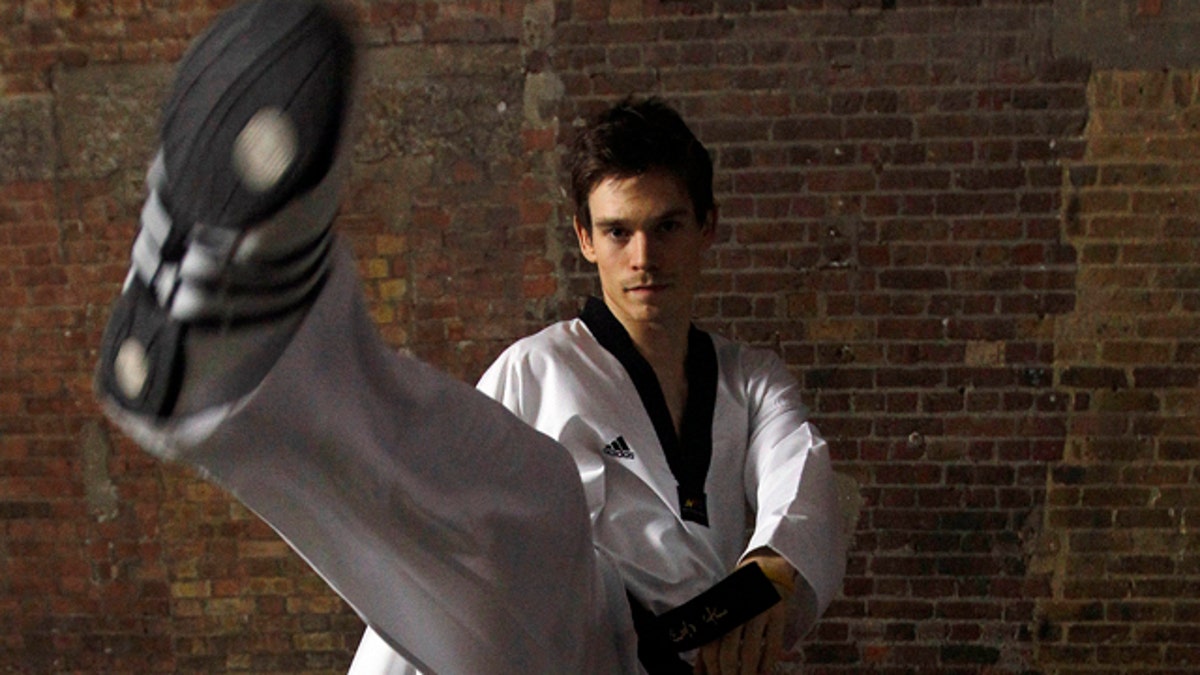
March 20, 2012: In this photo, Britain's Aaron Cook, 21, a possible gold medal prospect in the 176 pounds Taekwondo event at the London 2012 Olympic Games, poses for photographs in London. (AP)
LONDON – Taekwondo fighters are spending hours perfecting their kicks as they prepare for the London Olympics. They may also be spending lots of time spying on their opponents.
With the rise of websites documenting nearly every match at major taekwondo competitions, players and their coaches are increasingly using surveillance to refine their fight strategies.
"We're looking for tactical patterns," said Gary Hall, performance director for Britain's taekwondo team. "Taekwondo is a dynamic, six-minute match and you need all the information you can get going into it."
Hall said his team has a library of fight footage for the world's top dozen fighters in each division going back several years.
The British team employs one full-time staffer to study the team's rivals at big competitions, noting things like which leg they favor, their preferred attack strategy and whether they unknowingly leave themselves open to being scored on.
To find out, athletes and coaches often watch the Youtube channel run by the World Taekwondo Federation, the sport's governing body. Taekwondo officials also use an Internet video system that has broadcast more than 8,000 matches from 30 major championships worldwide. Some teams send their own staff to film rivals' fights, to shoot kicks from specific angles to analyze players' techniques.
Hall said the surveillance strategy isn't about changing a particular fighter's style.
"If you change your athlete's style at game time, your plan is flawed," he said. "We are just looking at the fight styles out there and making sure our athletes are prepared against that and can deliver a certain tactic."
Fighters from different countries can have radically different styles, from Iranians who favor a conservative style that focuses on body shots to Asians who often use their flexibility to attack the head from close range.
Though some fighters may adopt various strategies depending on who they're facing, Hall said significantly switching a fighter's preferred style could make them more vulnerable to being attacked and less comfortable on the mat.
Some athletes said they prefer to figure out a way to stick with their own strengths rather than adopting another style that might work better, like switching from high kicks to more body shots.
"I watch some of the videos, but when I'm in the ring, it's mostly about doing what I'm good at and trying to make sure my spin (kicks) come off," said British fighter Aaron Cook, currently ranked third in the world in the 80-kilogram division. "But if I know someone will try to stop my spin kicks, I may need to change my game to set them up better."
Patrice Remarck, who coaches Cook and three other athletes who will be competing in London, said he uses the videos to figure out how best to defeat his fighters' competitors.
"When I watch the videos, I get an idea of (the competitor's) preferred techniques, so I can maybe change my player's strategy to give us the element of surprise," Remarck said.
One fighter whose techniques have been studied extensively by athletes and coaches worldwide is Steven Lopez, a two-time Olympic gold medallist and five-time world champion from the United States. Hall said the British team had done extensive video analysis of Lopez's fight techniques to figure out how best to counter them.
Lopez wasn't worried his opponents' surveillance of his strategies might hurt his chances at the games. The Texas-based fighter has a notoriously dangerous left leg he uses not only to attack his rivals, but to successfully block their kicks.
"Even if someone has been studying my tendencies, the key point is for me to come back with something a little bit different," Lopez said. "It's one thing to watch a video but it's another thing to be out there fighting in the ring."
Lopez said he doesn't watch too many tapes of his competitors, leaving that to his coach, older brother Jean.
"I have a basic blueprint of what I want to do, but I never go into the ring with a detailed plan," Lopez said. "Sometimes you need to just react and change your game plan in the heat of the moment to win."
